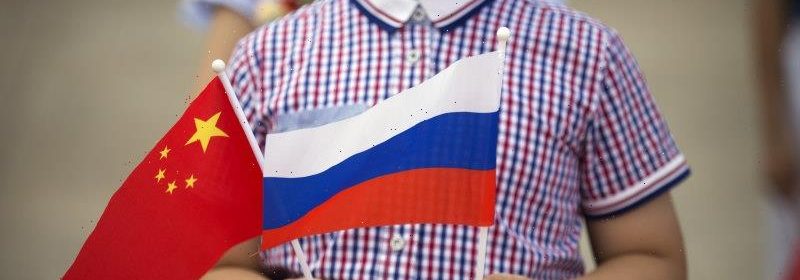China’s Ukraine dilemma: Confused rhetoric matches Beijing’s actions

Singapore: A week ago, China’s embassy in Ukraine told its residents to stay put and fly Chinese flags to protect themselves as the Russian army moved on Kyiv. Now it is racing to get them out of the Ukrainian capital – a sharp reversal in a conflict that initially emboldened Beijing but has now left it feeling frustrated and surprised.
China has veered between condemning international sanctions on Russia and calling for Ukraine’s territorial integrity to be respected. It has positioned itself as the eastern ballast to western overreach while watching with increasing alarm at both the brutality of Russia’s invasion and the international response to it.
Shoulder to shoulder: China’s Xi Jinping and Russia’s Vladimir Putin Moscow in 2019. Credit:AP
Asked on Monday night if China’s stance on the situation in Ukraine could be described “as neutral” Foreign Ministry spokesman Wang Wenbin said Beijing’s position “is consistent”, and the policy would be decided “based on the merits of the matter itself”.
Then on Tuesday AEDT, at the emergency UN Security Council meeting, Chinese ambassador Zhang Jun said: “nothing can be gained from stirring up a new Cold War, but everyone will stand to lose.”
But the confusion in Beijing’s rhetoric has matched its actions. Last week it lifted restrictions on imports of Russian wheat as Western sanctions began to bite, then on Monday Chinese ride-hailing app Didi reversed a decision to pull out of Russia after concerns were raised that it showed a lack of confidence in the Russian economy. The same day state-owned Chinese banks including the Bank of China and the Industrial & Commercial Bank of China stopped financing some deals involving Russian oil and commodities as they attempted to navigate global sanctions.
Capital Economics chief economist Neil Shearing said China appeared willing to show one level of symbolic support to Moscow, but not at a cost to its economy and international standing.
Cars stop at a roadblock set by civil defencemen at a road leading to central Kyiv. Credit:AP
“Among other things, Xi has much stronger reasons than Putin to avoid a complete rupture in relations with the West,” said Shearing.
While China has reaped huge benefits from economic integration by transforming itself into a global hub over the past two decades, Russia has gone the other way.
In China, individual economic wealth, or GDP per capita, has increased from less than 5 per cent of US levels in 1990 to nearly 30 per cent today. Over the same period, in Russia GDP per capita has fallen from more than 50 per cent of US levels in 1990 to just over 40 per cent today.
“Accordingly, Beijing and Moscow have different interests with respect to the global status quo,” said Shearing.
“China would like to shape it, but it has a strong interest in preserving it: Beijing’s actions show it wants to stamp its authority on the global economic order rather than dismantle it. In contrast, Russia’s [actions] indicate it has less incentive to preserve the current global order.”
China’s Foreign Ministry is now treading water by attempting to maintain good relations with its northern partner while becoming increasingly uncomfortable with Putin’s air strikes on civilians and bombing of Kyiv and Kharkiv.
The statements from Beijing over the past week have been carefully calibrated so that they can apply equally to the US, NATO and Russia.
“The security of a country can’t be built on compromising the security of other countries, let alone harming sovereignty and security of other countries out of the pursuit of its own absolute military superiority and absolute security,” said Wang.
Wang made clear that China and Russia were not allies despite Putin and President Xi Jinping signing a statement of “unbreakable friendship” at the Winter Olympics in Beijing last month.
Putin stands during the opening ceremony of the 2022 Winter Olympics in Beijing. Credit:AP
“China and Russia are comprehensive strategic partners of coordination. Our relationship features non-alliance, non-confrontation and non-targeting of any third party,” he said.
“All countries’ sovereignty and territorial integrity should be respected and upheld and the purposes and principles of the UN Charter should be jointly safeguarded. At the same time, we recognise the special historical complexities on the Ukraine issue and understand Russia’s legitimate security concerns.”
Russia waited until three days after the Olympics closed in Beijing to invade Ukraine.
“We think the Russian assault on Ukraine took Xi Jinping and co. by surprise,” said researchers from Trivium China who have parsed China’s intelligence timeline on Ukraine.
“One important thing to keep in mind here: Chinese foreign policy is notoriously risk-averse. So, it’s hard to imagine that Beijing would have so loudly and publicly aligned itself with Moscow if it knew what was coming.”
The Chinese embassy certainly did not. On Tuesday, the first group of 600 Chinese students from Odesa and Kyiv were evacuated across the border to Moldova – 1000 more will follow to Slovakia and Poland on Wednesday.
Get a note directly from our foreign correspondents on what’s making headlines around the world. Sign up for the weekly What in the World newsletter here.
Most Viewed in World
From our partners
Source: Read Full Article



